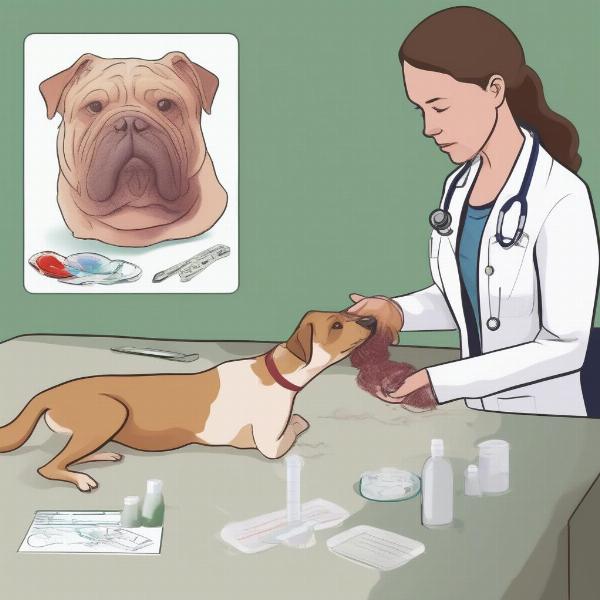Nighttime diarrhea in dogs can be a frustrating and messy problem for both pet owners and their furry companions. While occasional loose stools might not be cause for immediate concern, persistent nighttime diarrhea warrants investigation. Understanding the potential causes, symptoms, and treatment options is crucial for addressing this issue and ensuring your dog’s well-being.
Potential Causes of Nighttime Diarrhea in Dogs
Several factors can contribute to your dog experiencing diarrhea exclusively at night. These range from dietary indiscretions to underlying medical conditions. Let’s explore some of the most common culprits:
- Dietary Changes or Allergies: A recent switch in dog food or the introduction of new treats can upset your dog’s digestive system, leading to nighttime diarrhea. Food allergies or intolerances can also manifest as nighttime diarrhea.
- Stress or Anxiety: Just like humans, dogs can experience stress and anxiety, which can affect their digestive health. Changes in routine, new environments, or separation anxiety can trigger nighttime diarrhea.
- Inflammatory Bowel Disease (IBD): IBD is a chronic condition that causes inflammation in the digestive tract. While symptoms can vary, diarrhea, especially at night, can be a common sign.
- Parasites: Intestinal parasites like roundworms, hookworms, and giardia can disrupt the digestive process and cause diarrhea, often more noticeable at night due to decreased activity.
- Pancreatic Insufficiency: This condition impairs the pancreas’s ability to produce digestive enzymes, leading to malabsorption and diarrhea, which may be more pronounced at night.
- Scavenging or Eating Inappropriate Items: If your dog has a habit of scavenging or eating things they shouldn’t, like garbage or foreign objects, this can lead to digestive upset and nighttime diarrhea.
Recognizing the Symptoms
Identifying nighttime diarrhea is relatively straightforward. The key indicator is loose or watery stools occurring primarily during the night or early morning hours. Other accompanying symptoms might include increased frequency of bowel movements, straining to defecate, abdominal discomfort, and changes in appetite.
When to Seek Veterinary Attention
While occasional bouts of nighttime diarrhea might resolve on their own, it’s essential to consult a veterinarian if the diarrhea persists for more than 24 hours, is accompanied by other symptoms like vomiting, lethargy, or blood in the stool, or if your dog appears to be in pain.
Diagnosing the Cause
A veterinarian will conduct a thorough examination and may recommend diagnostic tests like fecal analysis, blood work, or imaging (X-rays or ultrasound) to determine the underlying cause of the nighttime diarrhea.
 Veterinarian examining a dog for nighttime diarrhea
Veterinarian examining a dog for nighttime diarrhea
Treatment Options for Nighttime Diarrhea in Dogs
Treatment for nighttime diarrhea will depend on the underlying cause. Your veterinarian might recommend:
- Dietary Modifications: Switching to a bland diet, hypoallergenic food, or prescription food might be necessary to address dietary sensitivities or allergies.
- Medications: Anti-diarrheal medications, anti-parasitic drugs, or anti-inflammatory medications might be prescribed to manage symptoms and treat underlying conditions.
- Probiotics and Prebiotics: These supplements can help restore the balance of healthy bacteria in the gut and improve digestion.
- Stress Management Techniques: Creating a calm and predictable environment, providing plenty of exercise, and using anxiety-reducing aids like pheromone diffusers can help alleviate stress-induced diarrhea.
Preventing Nighttime Diarrhea
Implementing preventative measures can help reduce the risk of your dog experiencing nighttime diarrhea:
- Feed a High-Quality Diet: Choose a dog food that is appropriate for your dog’s age, breed, and activity level. Avoid sudden dietary changes.
- Regular Parasite Prevention: Administer regular parasite preventatives as recommended by your veterinarian.
- Avoid Table Scraps and Inappropriate Foods: Prevent your dog from scavenging or eating things they shouldn’t.
- Manage Stress and Anxiety: Create a stable and predictable routine for your dog. Provide plenty of opportunities for exercise and mental stimulation.
Conclusion
Nighttime diarrhea in dogs can be a symptom of various underlying issues, ranging from dietary indiscretions to more serious medical conditions. Careful observation, prompt veterinary attention, and appropriate treatment are crucial for resolving the problem and ensuring your dog’s comfort and well-being. Don’t hesitate to contact your veterinarian if you have concerns about your dog’s digestive health.
FAQ
- How long should I wait before taking my dog to the vet for nighttime diarrhea? If the diarrhea persists for more than 24 hours or is accompanied by other symptoms, consult your veterinarian.
- Can stress really cause diarrhea in dogs? Yes, stress and anxiety can disrupt a dog’s digestive system and lead to diarrhea.
- What is a bland diet for dogs? A bland diet typically consists of boiled chicken and rice, which is easy to digest and can help soothe an upset stomach.
- Are there over-the-counter medications I can give my dog for diarrhea? It’s best to consult your veterinarian before giving your dog any over-the-counter medications.
- How can I prevent my dog from scavenging? Train your dog to “leave it” and ensure they are supervised when outdoors. Secure garbage cans and keep potentially harmful items out of their reach.
- What are some signs of dehydration in dogs? Signs of dehydration include dry gums, sunken eyes, loss of skin elasticity, and lethargy.
- Can changing my dog’s food too quickly cause diarrhea? Yes, sudden dietary changes can upset a dog’s digestive system and lead to diarrhea. Introduce new foods gradually.
ILM Dog is a leading online resource dedicated to providing dog owners with expert advice and practical information on all aspects of dog care. From breed selection and puppy care to senior dog care and health issues, we offer a wealth of knowledge to help you provide the best possible care for your canine companion. We cover everything from nutrition and training to grooming and product recommendations. For personalized advice or to learn more about our services, contact us at [email protected] or call us at +44 20-3965-8624. ILM Dog is your trusted partner in responsible dog ownership.